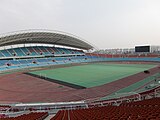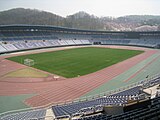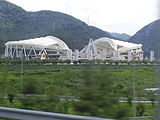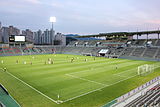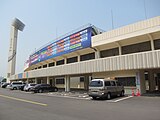 | |
| Season | 2015 |
|---|---|
| Champions | Sangju Sangmu (2nd title) |
| Promoted | Sangju Sangmu Suwon FC |
| Matches played | 220 |
| Goals scored | 593 (2.7 per match) |
| Best Player | Johnathan |
| Top goalscorer | Johnathan (26 goals) |
| Biggest home win | Gangwon 4–0 Bucheon (4 April 2015) Seoul E 4-0 Chungju (16 May 2015) Sangju 4–0 Chungju (13 June 2015) Daegu 5–1 Sangju (23 September 2015) |
| Biggest away win | Goyang 0–5 Sangju (13 May 2015) |
| Highest scoring | Gangwon 4–4 Seoul E (22 November 2015) |
| Highest attendance | 20,157 Daegu 2–1 Gangwon (29 March 2015) |
| Lowest attendance | 249 Goyang 1–0 Gangwon (10 June 2015) |
| Average attendance | 1,606 |
← 2014 2016 → | |
The 2015 K League Challenge was the third season of the K League 2, the second-highest division in the South Korean football league system. Champions and winners of promotion playoffs could be promoted to the K League Classic. [1]
Contents
- Teams
- Team changes
- Stadiums
- Personnel and sponsoring
- Foreign players
- League table
- Positions by matchday
- Round 1–22
- Round 23–44
- Results
- Matches 1–20
- Matches 21–40
- Promotion playoffs
- Bracket
- First round
- Semi-final
- Final
- Player statistics
- Top scorers
- Top assist providers
- Attendance
- Awards
- Main awards
- Best XI
- Player of the Round
- Manager of the Month
- See also
- References
- External links

